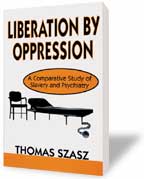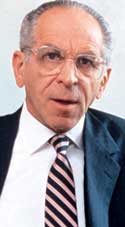
Psychiatric Slavery vs. Individual Liberty
Reviewed By Marie Bannon
 Liberation by Oppression By Thomas Szasz Transaction Publisher, Paperback, 251 pages |
In 1999, Michael Marcavage, a student at Temple University, learned of an upcoming university production of “Corpus Christi,” a play that depicts Jesus Christ as a homosexual.
A dean’s list student, former White House intern and devout Christian, Marcavage complained about the play to the university’s president, among others. He posted fliers “so that all Christians on campus would be aware of this horrible play” and made plans for a protest outside the theater when the production opened.
Afraid that a demonstration might spark conflict among students, university officials persuaded Marcavage not to hold the protest and agreed to help him build a stage for a program on two consecutive nights to spotlight traditional Christian values. Marcavage lined up speakers, a choir, a band and performers for a play.
After the agreement was forged, however, Marcavage was summoned to the office of Vice President of Campus Safety William Bergman, who informed him that a stage could not be provided, due to costs.
When Marcavage said he would cover the expense of building the stage, he was told, without explanation, that his program could not proceed. Marcavage then excused himself, went to the bathroom, locked the door and prayed about what he should do next.
![]() Involuntarily Committed
Involuntarily Committed
After Bergman banged on the door, insisting that Marcavage open it and resume their conversation, Marcavage did so, explaining that he thought their talk was over. As reported by WorldNetDaily.com:
“Next, according to Marcavage, Bergman ’physically’ forced him back into the vice president’s office and ’pushed me into a chair and held me with his arm.’ ... Marcavage asked to leave but Bergman ’allegedly refused to allow it.’
“Attempting to rise, [Marcavage] said the vice president tripped him to the floor,’ then was ’manhandled’ to a nearby couch” by Bergman and another campus security official, who “held him down.”
A university police officer appeared on the scene and handcuffed Marcavage, after which police took him to the Emergency Crisis Center at Temple University Hospital, where he was involuntarily committed.
The university’s doctors could see no reason to detain Marcavage, and released him from the hospital some hours later. Marcavage sued the university for damages, a case still pending as Freedom went to press.
![]() Nationwide Human Rights Battle
Nationwide Human Rights Battle
Such incidents of involuntary commitment—the vast majority without lawsuits and attendant publicity, thus unnoticed by the public—inflame a human rights battle across the country, where involuntary commitment procedures have been brought before state legislatures in recent years.
While activists combat the issue on the plane of patients’ rights, a new paperback by America’s preeminent voice on psychiatric oppression tackles involuntary commitment on another, more fundamental level: slavery.
Thomas Szasz, M.D., whose writings have frequently appeared on the pages of Freedom, cuts to the chase in the immensely readable Liberation by Oppression, which includes the case of Michael Marcavage and others.
As always, Szasz knows whereof he speaks, and conveys a new and trenchant angle to illustrate the historical and legal similarities between psychiatric paternalism and chattel slavery. He quotes literary and historical sources at the beginning of each chapter, from Camus to Plautus, from Jefferson Davis to John Locke, to bring home his point.
From the Spanish Inquisition to the Dred Scott decision* of the 19th century, slavemongers have justified themselves in similar ways. Szasz illustrates, with examples, how psychiatry fits into this mold.
“We can now answer the question: How do psychiatrists acquire psychiatric slaves? The oldest method of psychiatric slave-catching consists of creating a special class of persons, originally called ’the mad’ or ’insane,’ now called ’the mentally ill’ or ’mentally ill and dangerous’; a special class of doctors, originally called ’mad-doctors’ and ’alienists,’ now called ’psychiatrists’; a special class of quasi-prisons, originally called ’mad-houses’ or ’insane asylums,’ now called ’mental hospitals’; and a special class of laws, called ’mental health laws,’ that authorize psychiatrists to forcibly confine mental patients in mental hospitals. This method of catching slaves has been used for three hundred years and is still the basic tool of the slave catcher.”
![]() Power Gained through
Technology to Subjugate
Power Gained through
Technology to Subjugate
Continuing his quest to debunk the myths of psychiatry, the author notes, “Since there is no illness in mental illness, and no therapy in psychotherapy, anything a person accredited as speaking for psychiatry and psychotherapy wants to call ’illness’ or ’therapy’ is, ipso facto, illness and therapy.”
 “I OPPOSE PSYCHIATRIC SLAVERY because I believe it is inimical to individual liberty and responsibility, to the rule of law, and to the very existence of a free society.” |
Szasz finds that as psychiatrists have basically invented their classifications of “mental illness” in order to control ever-larger segments of the population, their ability to enslave others has expanded within the modern legal system.
“The core element of psychiatric slavery, the coercive control of the mental patient by the psychiatrist, has not changed since the 17th century. What has changed and changes continuously, is the psychiatrist’s method of coercion, the scope of his powers, and the legal and social justification for his use of force.”
He writes, “Psychiatric coercion is both the solution for, and a cause of, the problem of the dangerousness of the mental patient. The threat of psychiatric coercion is often the precipitating cause of assault, murder and suicide.
“It is intrinsic to the nature of the master-slave relationship that the slave poses a permanent threat to his oppressor. In the antebellum South, it was received wisdom that ’The negro, as a general rule, is mendacious.’ In the United States today, it is received wisdom that the mental patient is dangerous.”
![]() Psychiatry vs. A Free Society
Psychiatry vs. A Free Society
Coercion, however, affects much more than the “mental patient.”
Szasz cites examples of the “slave-catching” techniques that have pervaded society at the behest of psychiatry, including the experience of Temple student Michael Marcavage.
As John Stuart Mill noted, “Recent circumstances have made it a matter of notoriety, that confinement in a madhouse is the wisest means of getting rid of, or bringing to terms, refractory wives.... A perfectly innocent person can be fraudulently kidnapped, seized, and carried off to a madhouse on the assertion of any two so-called medical men, who have scarcely seen the victim whom they dismiss to a condition far worse than penalty which the law inflicts for proved crime.”
Mill wrote the above in 1858.
As Szasz notes:
“Psychiatric slavery is the oldest and most characteristic feature of the therapeutic state, which, in turn, is the modern, secular incarnation of the theocratic state. Each is a species of political absolutism: one based on the pharmacratic rights of medical protectors, the other on the divine rights of royal protectors....
“I oppose psychiatric slavery because I believe it is inimical to individual liberty and responsibility, to the rule of law, and to the very existence of a free society.”
Once again, Thomas Szasz gets to the point.
|


